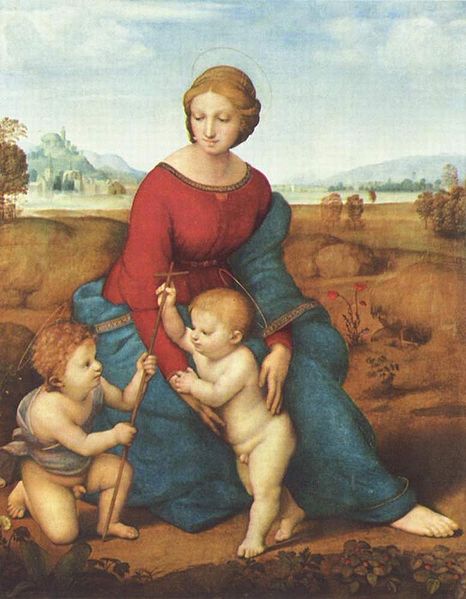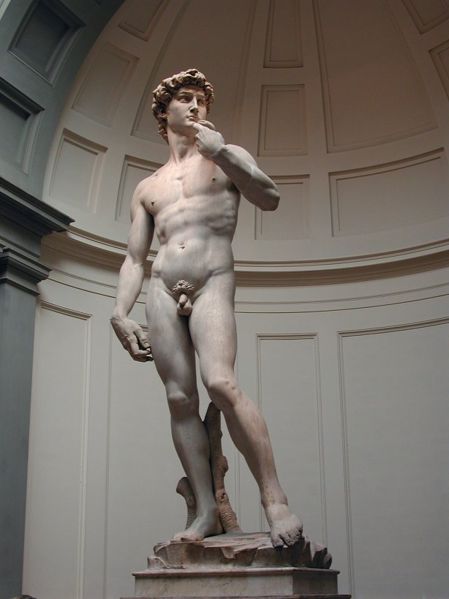

Last Judgement
With His lady Vittoria Colonna,
His first epistle to Vittoria is as follows: " I desired, lady, before I accepted the things which your ladyship has often expressed the will to give me — I desired to produce some-thing for you with my own hand, in order to be as little as possible unworthy of this kindness. I have now come to recognize that the grace of God is not to be bought, and that to keep it waiting is a grievous sin. Therefore I acknowledge my error, and willingly accept your favors. When I possess them, not indeed because I shall have them in my house, but for that I myself shall dwell in them, the place will seem to encircle me with Paradise. For which felicity I shall remain ever more obliged to your ladyship than I am already, if that is possible.
" The bearer of this letter will be Urbino, who lives in my service. Your ladyship may inform him when you would like me to come and see the head you promised to show me."
The letter was accompanied by this son-net:
" Seeking at least to be not all unfit
For thy sublime and boundless courtesy,
My lowly thoughts at first were fain to try
What they could yield for grace so infinite.
But now I know my unassisted wit
Is all too weak to make me soar so high,
For pardon, lady, for this fault I cry,
And wiser still I grow, remembering it.
Yea, well I see what folly 'twere to think
That largess dropped from thee like dews from heaven
Could e're be paid by work so frail as mine !
To nothingness my art and talent sink ;
He fails who from his mortal stores bath given
A thousandfold to match one gift divine."
Here is a translation, by Symonds, who also translated those sonnets by the master which are here quoted, of a letter which Vittoria Colonna sent to Michael Angelo from Viterbo:
"MAGNIFICENT MESSER MICHELANGELO.
-I did not reply earlier to your letter, because it was, as one might say, an answer to my last ; for I thought that if you and I were to go on writing without intermission according to my obligation and your courtesy, I should have to neglect the Chapel of S. Catherine here, and be absent at the appointed hours for company with my sister-hood, while you would have to leave the Chapel of S. Paul, and be absent from morning through the day from your sweet usual colloquy with painted forms, the which with their natural accents do not speak to you less clearly than the living persons round me speak to me. Thus we should both of us fail in our duty, I to the brides, you to the vicar of Christ. For these reasons, inasmuch as I am well assured of our steadfast friendship and firm affection, bound by knots of Christian kindness, I do not think it necessary to obtain the proof of your good will in letters by writing on my side, but rather to await with well-prepared mind some substantial occasion for serving you. Mean-while I address my prayers to that Lord of whom you spoke to me with so fervent and humble a heart, when I left Rome, that when I return thither I may find you with his image renewed and enlivened by true faith in your soul, in like measure as you have painted it with perfect art in my Samaritan. Believe me to remain always yours and your Urbino's."
The friendship between these two noble souls came to an end, as far as death can end such things, in 1547, when Vittoria Colonna passed from earth.
" All my friends are dead ; And she is dead, the noblest of them all.
I saw her face, when the great Sculptor Death, Whom men should call Divine, had at a blow Stricken her into marble ; and I kissed Her cold white hand."'
' Longfellow's "Michael Angelo."
Vittoria Colonna had been at rest seven-teen years when the end of a long life and of many colossal labors came to Buonarroti.
"Who shall doubt that these two have walked much together since, in that heaven where, they neither marry nor are given in marriage ? ' "

(Painting: Portrait of Pope Julius II by Raphael)
Pope Julius II
http://en.wikipedia.org/wiki/Pope_Julius_II (c. 5 December 1443 – 21 February 1513), nicknamed "The Terrible Pope" (Il Papa Terribile)[1] and "The Warrior Pope" (Il Papa Guerriero),[2] was born Giuliano della Rovere. He was Pope from 1503 to 1513. His reign was marked by an aggressive foreign policy, ambitious building projects, and patronage for the arts.
and
http://en.wikipedia.org/wiki/Holy_Roman_Emperors#List_of_Emperors
Holy Roman Emperor

The School of Athens (逻辑思想的苦闷和征战) by Raphael
http://en.wikipedia.org/wiki/Raphael 以画地上的人物, 尤其是 沉思中的年长者见长。把当时流行描绘的圣经中人物, 用色彩在外面做包裹, 水份吸去, 变成不透明石膏式的, 或者只能半透明式的人物, 象在下面这一幅圣母,圣子及小天使的画儿中,

Size of this preview: 466 × 599 pixels
The Madonna of the Meadow, ca. 1506, using Leonardo's pyramidal composition for subjects of the Holy Family.[27]
http://en.wikipedia.org/wiki/File:Raffael_030.jpg
尽管对于老年人不但在形体动态上, 甚至对于外观表情都可以表达得相当细微。

而 Michael Angelo 却能够由一块 Marble 石, 打磨出一位透明, 闪亮, 神采飞扬, 健美有力, 机智勇敢又无畏的牧羊少年, 后来的 King David.
1 Samuel 17:54-56
54 David took the Philistine's head and brought it to Jerusalem, and he put the Philistine's weapons in his own tent.
55 As Saul watched David going out to meet the Philistine, he said to Abner, commander of the army, "Abner, whose son is that young man?"
Abner replied, "As surely as you live, O king, I don't know."
56 The king said, "Find out whose son this young man is."
大卫到达兵营 | |||
| 12 | 大卫是犹大伯利恒的以法他人耶西的儿子;耶西有八个儿子。在扫罗的日子,耶西已经年纪老迈了。 | ||
| 13 | 耶西的三个大儿子跟随了扫罗去作战。去了作战的这三个儿子的名字是:长子以利押、次子亚比拿达、三子沙玛。 | ||
| 14 | 大卫是最小的,那三个年长的都跟随扫罗去了。 | ||
| 15 | 大卫有时离开扫罗,回到伯利恒牧放他父亲的羊群。 | ||
| 16 | 那非利士人每天早晚都近前来,站着骂阵,一连有四十天之久。 | ||
| 17 | 有一天,耶西对他的儿子大卫说:“你拿这十公斤烘了的谷子和这十个饼去给你的哥哥们;你要跑到营里去给你的哥哥们, | ||
| 18 | 又拿这十块乳酪去给他们的千夫长,看看你的哥哥们平安不平安,把他们的家书带回来。” | ||
| 19 | 扫罗和大卫的哥哥们,以及以色列众人都在以拉谷与非利士人作战。 | ||
| 20 | 大卫清早起来,把羊群托给一个看守的人,就照着耶西所吩咐他的,带着食物去了。他来到军营中的时候,军队正出去列阵,吶喊助阵。 | ||
| 21 | 以色列人和非利士人都摆列阵势,互相对峙。 | ||
| 22 | 大卫把身上的东西留在看守物件的人手中,跑到战阵上去,向他的哥哥们问安。 | ||
| 23 | 大卫正与他们说话的时候,那个讨战的人,就是迦特的非利士人,名叫歌利亚,从非利士人阵中上来;他说的又是同样的那些话,大卫都听见了。 | ||
| 24 | 所有的以色列人一看见那人,就都从他面前逃跑,非常害怕。 | ||
| 25 | 以色列人彼此说:“这个上来的人你们看见了吗?他上来是要向以色列人骂阵的。如果有人能击杀他,王必赏赐他大财富,把自己的女儿给他作妻子,并且使他的父家在以色列中免纳税,免服役。” | ||
| 26 | 大卫问站在他旁边的人说:“如果有人击杀这个非利士人,除去以色列人的耻辱,那人会得到怎么的对待呢?这未受割礼的非利士人是谁呢?竟敢向永活的 神的军队骂阵?” | ||
| 27 | 于是众民用以上的那些话回答他说:“如果有人能击杀他,那人必得这样的对待。” | ||
| 28 | 大卫与那些人说话的时候,他的大哥以利押听见了,就向大卫发怒,说:“你为什么下这里来呢?在旷野的那几只羊你托了给谁呢?我知道你的骄傲和你心里的恶意。你下来是要看打仗。” | ||
| 29 | 大卫说:“我现在作了什么事呢?不是只说了一句话吗?” | ||
| 30 | 大卫离开他的哥哥,转向另一个人,问同样的问题。众民还是用先前的话回答他。 | ||
| 大卫自愿出战 | |||
| 31 | 有人听见大卫所说的这些话,就告诉扫罗;扫罗就派人去把大卫接来。 | ||
| 32 | 大卫对扫罗说:“大家都不要因这非利士人丧胆,你的仆人要去与这非利士人决斗。” | ||
| 33 | 扫罗对大卫说:“你不能去与这非利士人决斗,因为你年纪还轻,那人从小就作战士。” | ||
| 34 | 大卫对扫罗说:“你仆人是为父亲放羊的,有时狮子或熊来了,从羊群中抓去一只小羊, | ||
| 35 | 我就出去追赶它,击打它,从它的嘴里把小羊救出来。如果它起来攻击我,我就揪住它的胡须,击打它,把它杀死。 | ||
| 36 | 你仆人不但击杀过狮子,也击杀过熊。这个未受割礼的非利士人也必像一只狮子或熊一样,因为他向永活的 神的军队骂阵。” | ||
| 37 | 大卫又说:“那曾救我脱离狮爪和熊掌的耶和华,也必救我脱离这非利士人的手。”于是扫罗对大卫说:“你去吧!愿耶和华与你同在。” | ||
| 38 | 扫罗把自己的战袍给大卫穿上,把铜盔戴在他的头上,又给他穿上铠甲。 | ||
| 39 | 大卫把刀佩带在战袍上。因为他以前没有穿过,现在试着走一下。大卫对扫罗说:“穿戴着这些东西,我不能走动,因为我从前没有穿过。”大卫就把这些装备从身上脱下来。 | ||
| 40 | 他手中拿着自己的杖,又从溪里挑选了五块光滑的石子,放在口袋里,就是牧人用的那种袋子,手里又拿着甩石的机弦,就向那非利士人走近去。 | ||
| 大卫击杀歌利亚 | |||
| 41 | 那非利士人也向着大卫慢慢走过来,拿大盾牌的人在他前面走。 | ||
| 42 | 那非利士人观看,看见了大卫,就藐视他,因为他年纪还轻,面色红润,外貌英俊。 | ||
| 43 | 那非利士人对大卫说:“难道我是一条狗吗?你竟拿杖来攻击我。”于是指着自己的神咒诅大卫。 | ||
| 44 | 那非利士人又对大卫说:“你到我这里来吧!我要把你的肉给空中的飞鸟和田野的走兽吃。” | ||
| 45 | 大卫回答那非利士人:“你来攻击我是靠刀、靠枪,但我来攻击你是靠万军之耶和华的名;万军之耶和华就是你所辱骂的以色列军队的 神。 | ||
| 46 | 今天耶和华要把你交在我手里,我必击杀你,砍下你的头。今天我还要把非利士人军队的尸体给空中的飞鸟和地上的野兽吃。这样,全地的人就都知道以色列中有一位 神。 | ||
| 47 | 也使这些人群都知道,耶和华拯救人不是靠刀,不是靠枪,因为战争的胜败在于耶和华,他必把你们交在我们的手里。” | ||
| 48 | 那非利士人起身,迎着大卫慢慢走过来;大卫也赶快往阵上跑去,迎战那非利士人。 | ||
| 49 | 大卫伸手入口袋里,从里面拿出了一块石子来,用机弦甩去,击中了那非利士人的前额;石子穿入前额里面,他就仆倒,面伏于地。 | ||
| 50 | 这样,大卫用机弦和一块石子胜过了那非利士人。大卫击杀了那非利士人,但他手中没有刀。 | ||
| 51 | 大卫跑过去,站在那非利士人的身边,拿起他的刀来,把刀从鞘中拔出来,杀死他,又用刀砍下他的头。非利士人看见他们的勇士死了,就都逃跑。 | ||
| 52 | 以色列人和犹大人就起来,高声吶喊,追赶非利士人,直到迦特的入口和以革伦的城门。被刺死的非利士人都倒在沙拉音的路上,直到迦特和以革伦。 | ||
| 53 | 以色列人穷追非利士人回来以后,就抢掠他们的营房。 | ||
| 54 | 大卫拿起那非利士人的头,把它带到耶路撒冷去,却把那人的武器放在自己的帐棚里。 | ||
| 扫罗召见大卫 | |||
| 55 | 扫罗看见大卫出去迎战那非利士人,就问元帅押尼珥:“押尼珥啊,这个年轻人是谁的儿子?”押尼珥回答:“我敢指着王起誓,我不知道。” | ||
| 56 | 王说:“你去问问这个少年是谁的儿子。” | ||
| 57 | 大卫击杀了那非利士人回来的时候,押尼珥迎接他,把他带到扫罗面前,大卫手中还拿着那非利士人的头。 | ||
| 58 | 扫罗问他:“年轻人啊,你是谁的儿子?”大卫回答:“我是你仆人伯利恒人耶西的儿子。” | ||